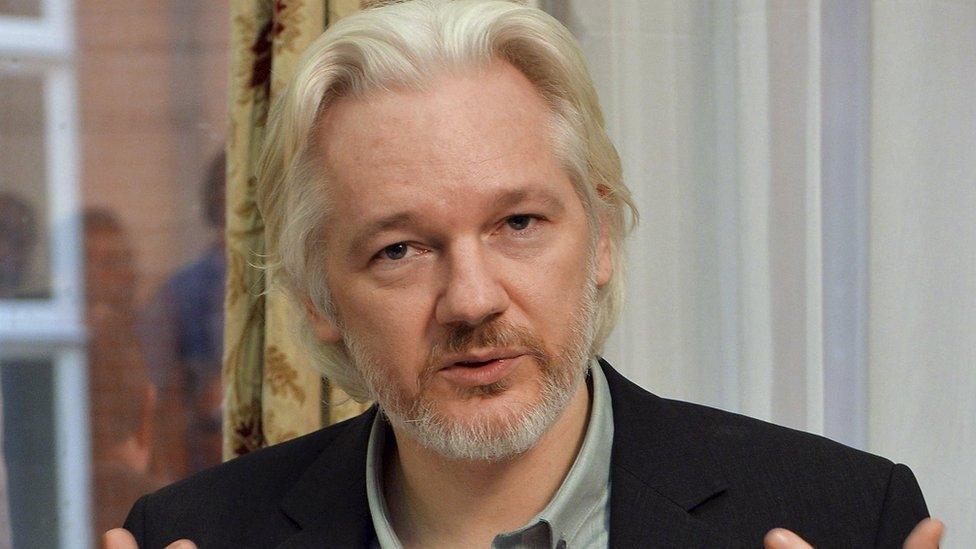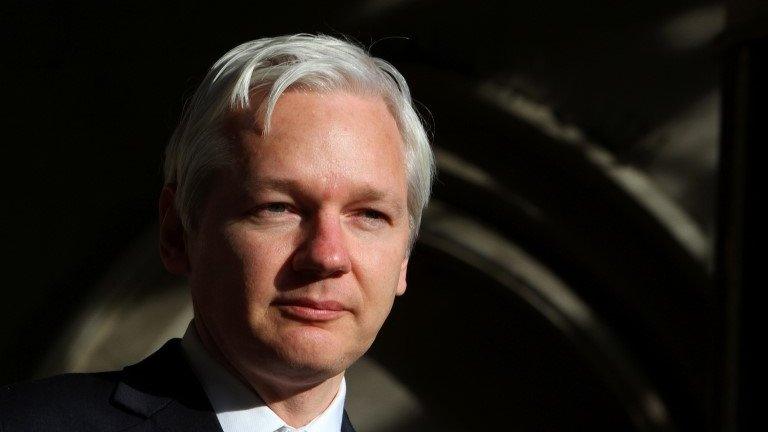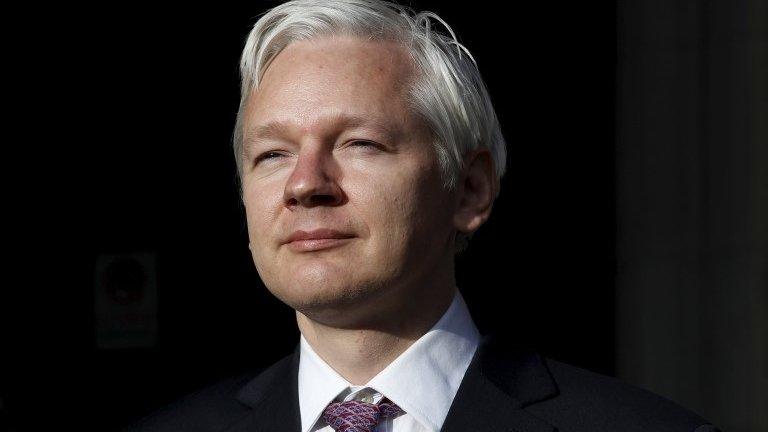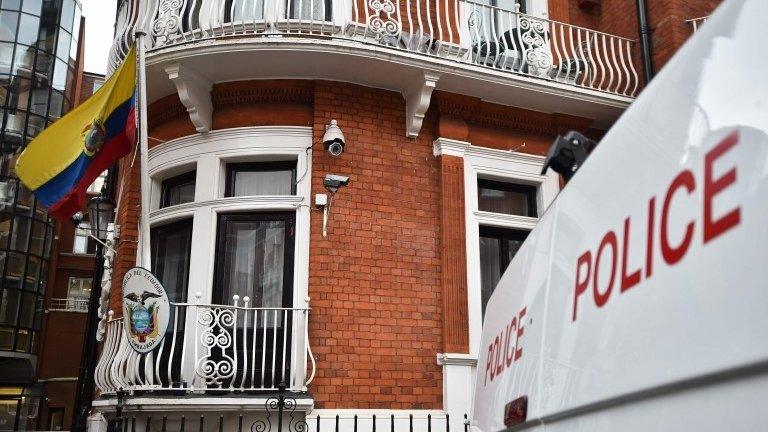Julian Assange should be allowed to go free, UN panel finds
- Published
- comments

Mr Assange appeared at a press conference via a video link
Wikileaks founder Julian Assange should be allowed to walk free and be compensated for his "deprivation of liberty", a UN legal panel has found.
Mr Assange, 44, - who faces extradition to Sweden over a rape claim, which he denies - claimed asylum in London's Ecuadorean embassy in 2012.
He has been arbitrarily detained since his arrest in 2010, the panel said, external.
The UK foreign secretary said the decision was "ridiculous", but Mr Assange hailed a "significant victory".
Speaking at a news conference via a video link from the embassy, he said the opinion of the panel was "vindication", adding: "The lawfulness of my detention is now a matter of settled law."
Mr Assange said it was a "really significant victory that has brought a smile to my face".
However, the UK Foreign Office said the report "changes nothing" and it will "formally contest the working group's opinion".
Foreign Secretary Philip Hammond said Mr Assange was a "fugitive from justice", adding that he can come out "any time he chooses" but will still have to face justice in Sweden.
The Met Police said it will make "every effort" to arrest Mr Assange should he leave the embassy.
The government says the panel's ruling is not legally binding in the UK and a European Arrest Warrant remains in place - meaning the UK continues to have a legal obligation to extradite Mr Assange.
Why is Julian Assange back in the news?
The UN's Working Group on Arbitrary Detention insisted Mr Assange's detention "should be brought to an end, that his physical integrity and freedom of movement be respected".
"Mr Assange should be afforded the right to compensation," it added.
The Wikileaks founder had been subjected to "different forms of deprivation of liberty" it said, initially while he was held in isolation at London's Wandsworth Prison for 10 days in 2010.
The deprivation had been "continuous" since he was initially arrested in the UK on 7 December 2010.
It also found a "lack of diligence" by the Swedish Prosecutor's Office in its investigations, which resulted in his lengthy loss of liberty.
Three members of the five-person panel found in Mr Assange's favour, while one rejected his claim and another did not take part in the investigation.

Analysis
Is Julian Assange leaving the Ecuadorean embassy?
By Caroline Hawley, BBC diplomatic correspondent
Julian Assange and his supporters will see this as a significant moral victory.
The Wikileaks founder, who walked into the Ecuadorian Embassy after losing a series of appeals in British courts, now has an important panel of UN legal experts on his side.
Legally binding or not, a UN official said the decision was based on international law.
Although both Britain and Sweden are firmly sticking to their guns, they are now in an extremely awkward position. The Swedish government has seized on the dissenting voice in the panel - who argued, as Britain does, that Mr Assange fled bail and was using the Ecuadorian embassy to evade arrest.
The call for compensation for Mr Assange is particularly controversial when there is already public anger in the UK over the cost of policing his confinement at the embassy.

A Foreign Office spokesman said Mr Assange "has never been arbitrarily detained by the UK", adding: "He is, in fact, voluntarily avoiding lawful arrest by choosing to remain in the Ecuadorean embassy."
"We are deeply frustrated that this unacceptable situation is still being allowed to continue," the spokesman added.
The UK's permanent representative to the UN, Julian Braithwaite, has written to the panel expressing the government's surprise and disappointment with the outcome.
The Swedish government said Mr Assange was free to leave the embassy at any point and said he was not being deprived of his liberty.
In September 2014, Mr Assange - who has been living in the embassy for more than three years - complained to the UN that he was being "arbitrarily detained" as he could not leave without being arrested.
The complaint, external against the UK and Sweden claimed Mr Assange had been deprived of his liberty for an "unacceptable length of time".
In a statement posted on Twitter on Thursday, external, Mr Assange said his passport should be returned and his arrest warrant dropped if the UN panel ruled in his favour.
The Australian had his passport taken by UK authorities during the investigation.

What does the UN panel do?
The UN's Working Group on Arbitrary Detention is made up of five legal experts from around the world.
Established in 1991, it has made hundreds of rulings on whether imprisonment or detention is lawful.
High profile complainants include Washington Post journalist Jason Rezaian, who was released in Iran last month.
It also offered an opinion on former pro-democracy President Mohamed Nasheed, released in the Maldives last year, and Myanmar party leader, Aung San Suu Kyi.

Mr Assange was originally arrested in London in 2010 under a European Arrest Warrant issued by Sweden over rape and sexual assault claims.
In 2012, while on bail, he claimed asylum inside the Ecuadorean embassy in Knightsbridge after the UK Supreme Court had ruled the extradition against him could go ahead.
Assange's supporter and friend Vaughan Smith hopes he will now be freed
Swedish prosecutors dropped two sex assault claims against Mr Assange last year. However, he still faces the more serious accusation of rape.

Julian Assange: Key dates
August 2010 - Swedish prosecutors issue an arrest warrant for Mr Assange
May 2012 - UK Supreme Court rules he should be extradited to Sweden to face questioning
June 2012 - Mr Assange claims asylum in the Ecuadorean embassy in London
September 2014 - Mr Assange submits complaint against Sweden and the UK to the UN Working Group on Arbitrary Detention
August 2015 - Swedish prosecutors drop their investigation into two allegations - one of sexual molestation and one of unlawful coercion - but say he still faces the more serious accusation of rape.
October 2015 - Met Police announce officers will no longer be stationed outside the Ecuadorean embassy
- Published4 February 2016

- Published4 February 2016

- Published13 August 2015

- Published6 February 2015
